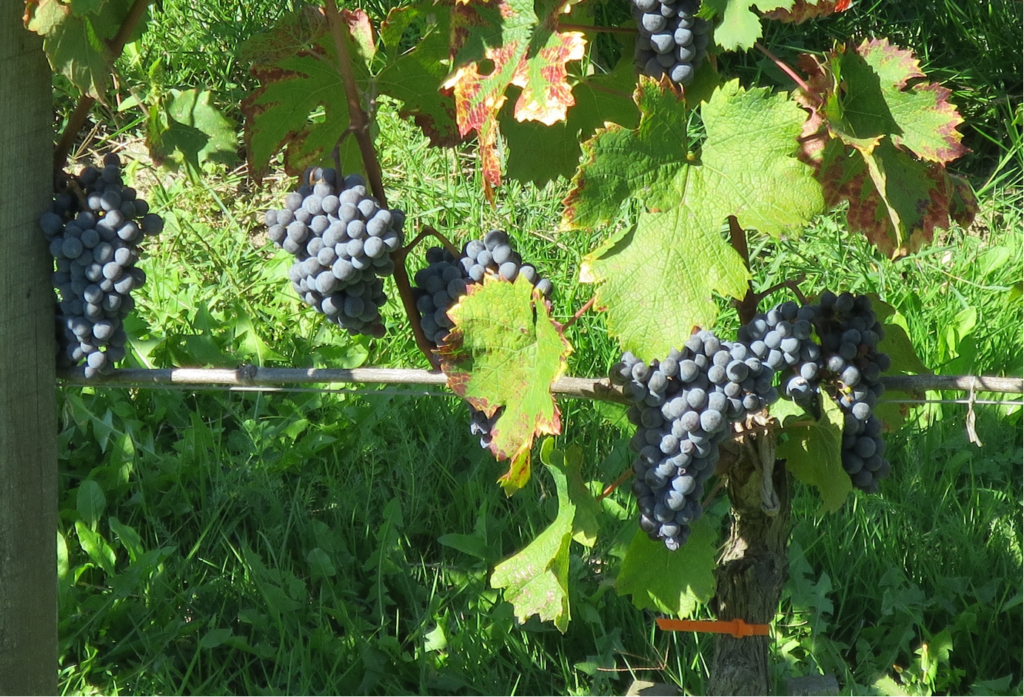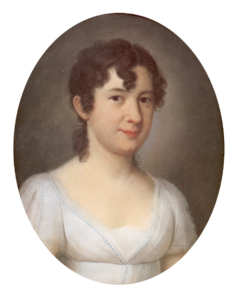East wind
(Poet's title: Ostwind)
Set by Schubert:
D 720
[March 1821]
Part of Goethe: West-Östlicher Divan
Was bedeutet die Bewegung?
Bringt der Ost mir frohe Kunde?
Seiner Schwingen frische Regung
Kühlt des Herzens tiefe Wunde.
Kosend spielt er mit dem Staube,
Jagt ihn auf in leichten Wölkchen,
Treibt zur sichern Rebenlaube
Der Insecten frohes Völkchen.
Lindert sanft der Sonne Glühen,
Kühlt auch mir die heißen Wangen,
Küsst die Reben noch im Fliehen,
Die auf Feld und Hügel prangen.
Und mir bringt sein leises Flüstern
Von dem Freunde tausend Grüße;
Eh noch diese Hügel düstern,
Grüßen mich wohl tausend Küsse.
Und so kannst du weiter ziehen,
Diene Freunden und Betrübten.
Dort wo hohe Mauern glühen,
Find ich bald den Vielgeliebten.
Ach! die wahre Herzenskunde,
Liebeshauch, erfrischtes Leben,
Wird mir nur aus seinem Munde,
Kann mir nur sein Atem geben.
What does this movement mean?
Is the Easterly wind bringing me a joyful message?
The fresh stirring of its wings
Cools the deep wounds in my heart.
As it caresses it is playing with the dust,
It chases it up to make small, light clouds,
It drives insects towards the secure foliage of the vine –
A joyful little population of insects.
It gently soothes the glow of the sun,
It also cools my hot cheeks for me,
And as it passes by it even kisses the vines,
Which are resplendent on the fields and hills.
And its gentle whisper brings me
A thousand greetings from my friend;
Even before these hills grow dark
As many as a thousand kisses are going to greet me.
And so you can travel on further!
Offer your services to friends and those who are distressed.
There where high walls are glowing,
That is where I shall soon find the one I love so much.
Oh, the true message from the heart,
The breath of love, refreshed life
Will only come to me from his mouth,
Only his breath can give it to me.
All translations into English that appear on this website, unless otherwise stated, are by Malcolm Wren. You are free to use them on condition that you acknowledge Malcolm Wren as the translator and schubertsong.uk as the source. Unless otherwise stated, the comments and essays that appear after the texts and translations are by Malcolm Wren and are © Copyright.
☙
Themes and images in this text:
Beetles and other insects Breath and breathing Cheeks Clouds Dust East and West Fields and meadows Games and play Greetings Hearts Heat Hills and mountains Hunters and hunting Kissing Leaves and foliage Mouths Soothing and healing Whispering Wind Wine and vines Wings Wounds
The poems in the ‘Books of Suleika’ in Goethe’s 1819 West-östlicher Divan (‘West-eastern collection’) are presented as parts of a dialogue between two lovers, Hatem and Suleika, in the style of the 14th century Persian poet Hafez of Shiraz. Contemporary readers were encouraged to join Goethe in bridging the geographical, historical and cultural gulf by opening themselves to these voices from the east and the past. What they did not know was that the dialogue between Suleika and Hatem had actually originated much closer to home. Goethe had not recreated the voice of a medieval Persian woman in Suleika’s lyrics. He had not even written them himself. They were the work of Marianne von Willemer, and her texts were produced in Frankfurt not Shiraz. She was (in) the west and she was writing about receiving news from ‘the east’ (Weimar, in fact, rather than Persia).
The private correspondence between Marianne von Willemer (who portrayed herself as Suleika, the traditional name of Potiphar’s wife in the Islamic tradition) and Johann Wolfgang von Goethe was the result of a form of sublimated passion. They only met on a number of brief occasions in 1814 and 1815 and both were married, but they found fulfilment in writing to each other in the style of Goethe’s latest literary passion. She appears to have raised no objections to her lyrics appearing under Goethe’s own name and she waited many years after his death before claiming her own authorship of them.
Schubert thus unknowingly set two of her poems to music, this ‘East Wind’ (Suleika I) and ‘West Wind’ (Suleika II, D 717). Even stripped of any biographical associations these two love poems still work on at least two levels: a woman (unable to move far, perhaps because she is in purdah) sends messages on the west wind to be carried to her beloved and waits for easterlies to blow so that she can hear from him; a modern, western poet takes inspiration from the beloved poetry of the east and produces something on the same lines in response. These two levels of significance are hinted at in the first and last lines of ‘Ostwind’: ‘What does this movement (of the air) signify?’ – ‘His breath (Athem) inspires me’. The word ‘Athem’ (breath, modern spelling ‘Atem’) is an anagram of ‘Hatem’, the name of Suleika’s distant beloved, so the wind that arrives from the east is actually his own breath. His sighs and his words carry his essence to her and she breathes it in. This is ‘inspiration’.
Hatem’s breath speaks to Suleika, but it does so much more: it moves, it cools, it soothes, it caresses, it plays. It chases the dust and it drives insects onto leaves. It carries greetings and kisses. It then goes off to serve others. It is all action, in contrast to Suleika’s own inability to move. She seems to be bounded by hills on one side and walls on the other. She is looking out on a hot, dusty landscape, though the fields and hills nearby are resplendent with vines (we know that they are not far away since she can see the insects on the vine leaves). This reminds us that the poetry of Hafez which inspired the text celebrated the pleasures of wine as much as the delights of love. Suleika is therefore speaking from the centre of everything that can give her lover gratification. She declares that only his mouth can satisfy her desire for news and for his presence (in the form of a kiss), but she can nevertheless offer him a taste of what he longs for.


☙
Original Spelling Suleika I Was bedeutet die Bewegung? Bringt der Ost mir frohe Kunde? Seiner Schwingen frische Regung Kühlt des Herzens tiefe Wunde. Kosend spielt er mit dem Staube, Jagt ihn auf in leichten Wölkchen, Treibt zur sichern Rebenlaube Der Insecten frohes Völkchen. Lindert sanft der Sonne Glühen, Kühlt auch mir die heißen Wangen, Küßt die Reben noch im Fliehen, Die auf Feld und Hügel prangen. Und mir bringt sein leises Flüstern Von dem Freunde tausend Grüße; Eh noch diese Hügel düstern Grüßen mich wohl tausend Küsse. Und so kannst du weiter ziehen! Diene Freunden und Betrübten. Dort wo hohe Mauern glühen, Find' ich bald den Vielgeliebten. Ach, die wahre Herzenskunde, Liebeshauch, erfrischtes Leben Wird mir nur aus seinem Munde, Kann mir nur sein Athem geben. Marianne von Willemer's original text (before Goethe made his changes) was as follows (with differences marked in italics): Ostwind Was bedeutet die Bewegung? Bringt der Ostwind frohe Kunde? Seiner Schwingen frische Regung Kühlt des Herzens tiefe Wunde. Kosend spielt er mit dem Staube, Jagt ihn auf in leichten Wölkchen, Treibt zur sichern Rebenlaube Der Insecten frohes Völkchen. Lindert sanft der Sonne Glühen, Kühlt auch mir die heißen Wangen, Küßt die Reben noch im Fliehen, Die auf Feld und Hügel prangen. Und mich soll sein leises Flüstern Von dem Freunde lieblich grüßen; Eh noch diese Hügel düstern Sitz ich still zu seinen Füßen. Und du magst nun weiterziehen! Diene Frohen und Betrübten. Dort wo hohe Mauern glühen, Finde ich bald den Vielgeliebten. Ach, die wahre Herzenskunde, Liebeshauch, erfrischtes Leben Wird mir nur aus seinem Munde, Kann mir nur sein Athem geben.
Confirmed by Peter Rastl with Schubert’s source, Goethe’s Werke. Ein und zwanzigster Band. Original-Ausgabe. Wien, 1820. In Carl Armbruster’s Buchhandlung. Stuttgart. In der J. G. Cotta’schen Buchhandlung. Gedruckt bey Anton Strauß. pages 152-153; with Goethe’s Werke. Vollständige Ausgabe letzter Hand. Fünfter Band. Unter des durchlauchtigsten deutschen Bundes schützenden Privilegien. Stuttgart und Tübingen, in der J. G. Cotta’schen Buchhandlung. 1827, pages 180-181; and with West-oestlicher Divan. von Goethe. Stuttgard, in der Cottaischen Buchhandlung 1819, pages 161-162.
To see an early edition of the text, go to page 152 [162 von 500] here: http://digital.onb.ac.at/OnbViewer/viewer.faces?doc=ABO_%2BZ22342380X


